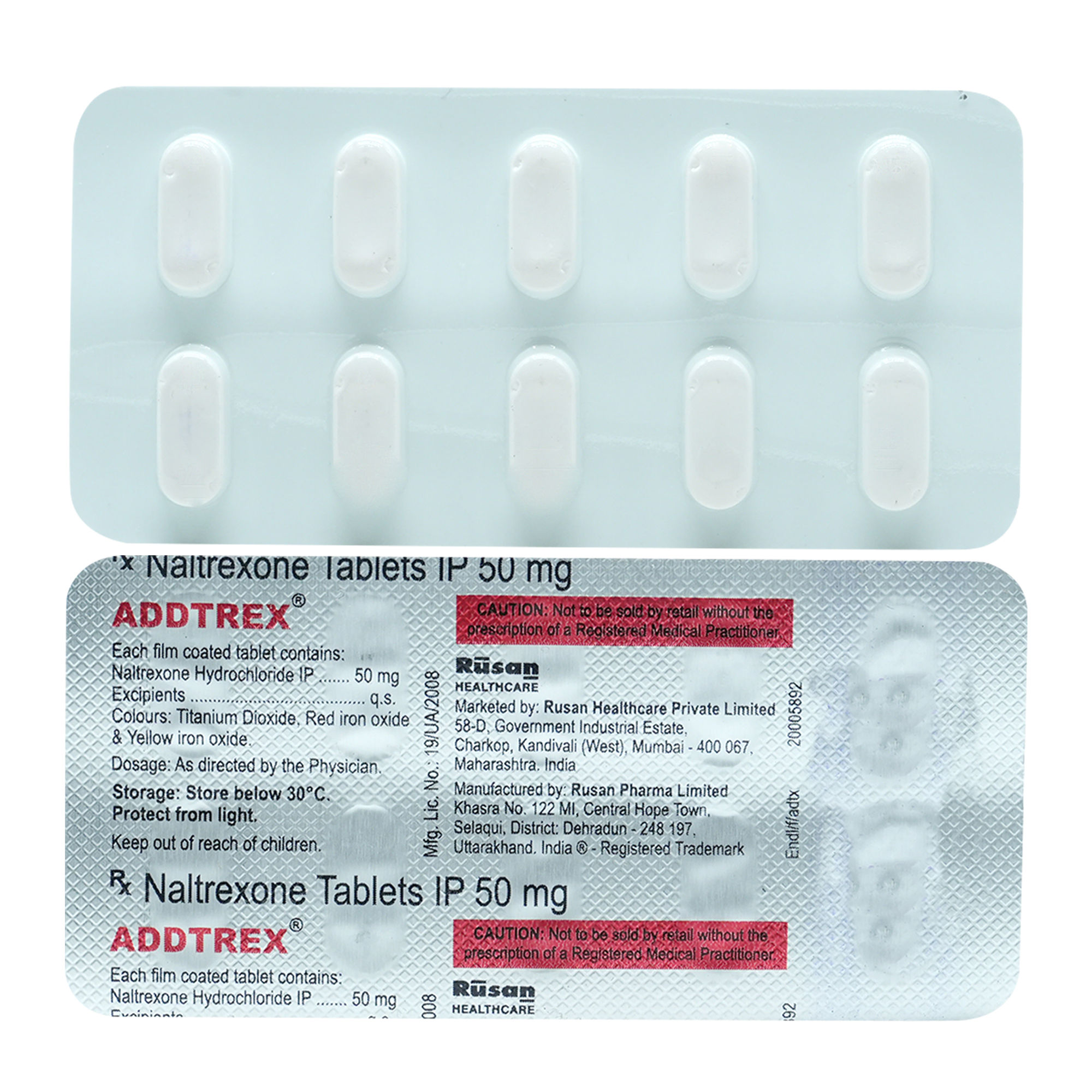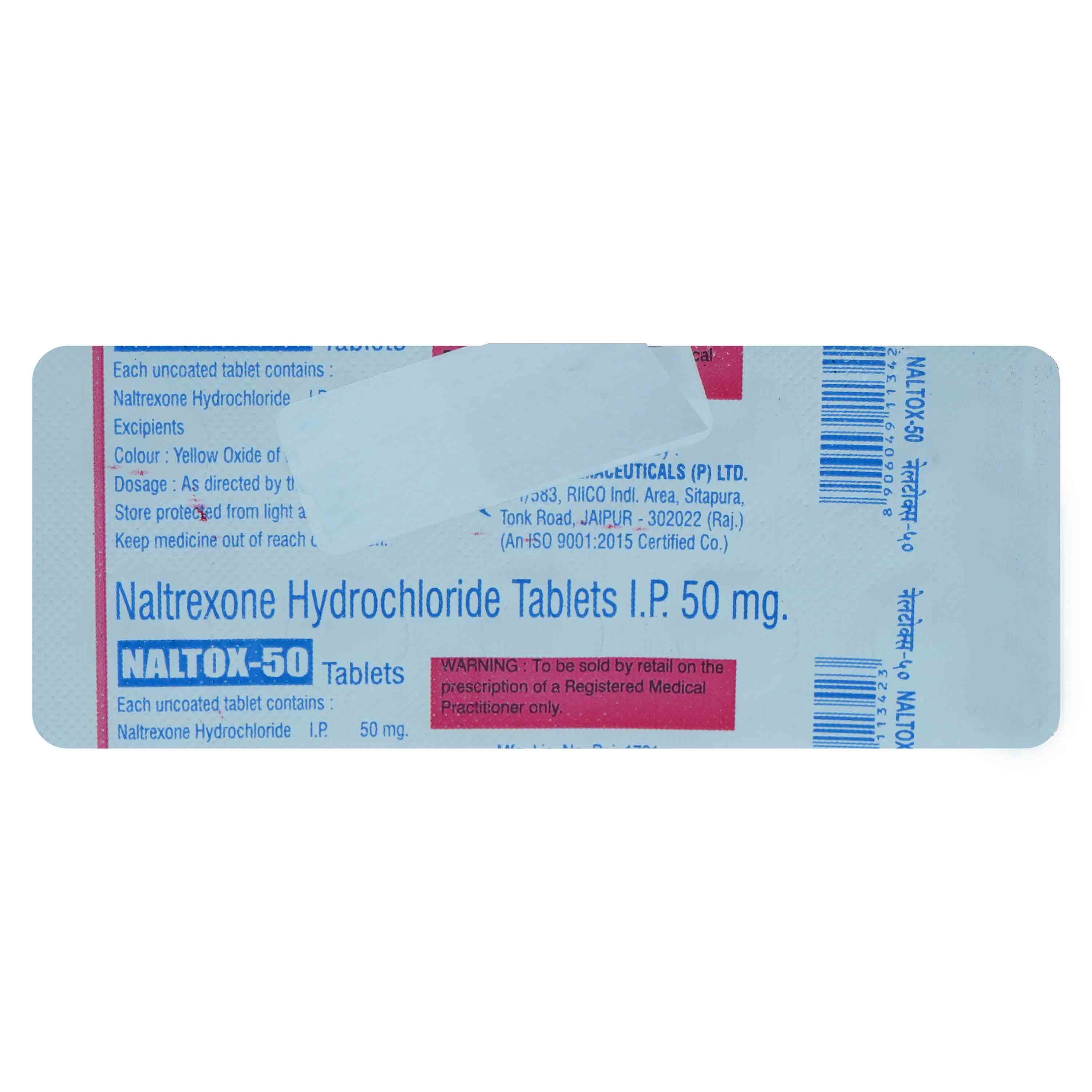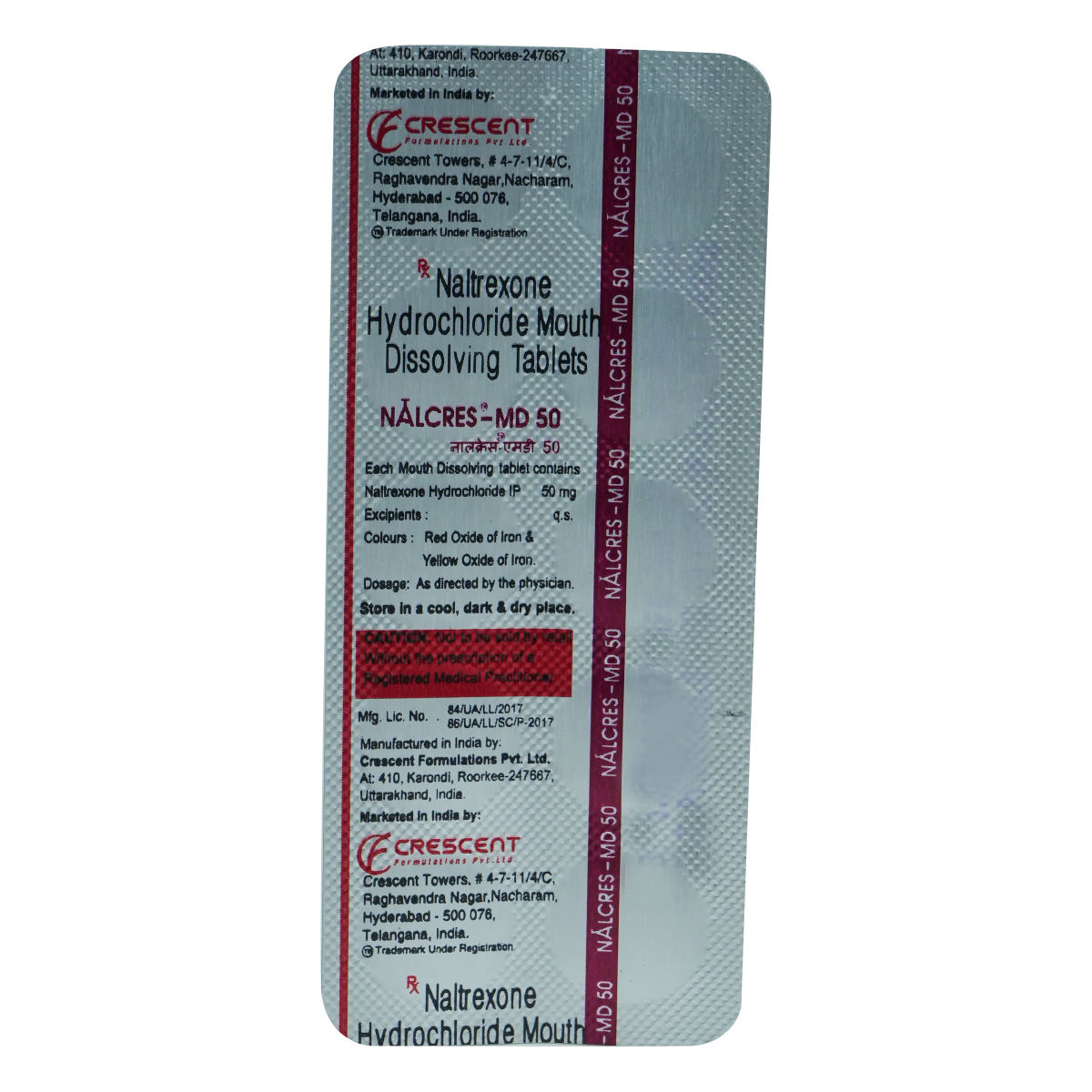Naltrexone
About Naltrexone
Naltrexone belongs to the class of medications called 'opioid-antagonist' used to treat alcohol dependence (chronic alcoholism) and opioid dependence. Alcohol dependence is a chronic medical condition that typically includes a current or past history of excessive drinking, a strong craving for alcohol, continued use despite repeated problems with drinking, and an inability to control alcohol consumption. Opioid dependence is a condition when someone becomes physically dependent on a substance; their body relies on it to avoid withdrawal.
Naltrexone contains 'naltrexone'. It works by blocking the effect of opioid receptors and decreasing cravings and urges to use alcohol or opioids. Still, it is used along with counselling and social support to help patients dependent on alcohol abstain from drinking alcoholic drinks.
Naltrexone should be taken as prescribed by your doctor. Some cases Naltrexone may cause certain side effects such as nausea, vomiting, injection site reactions (including induration, pruritus, nodules and swelling), muscle cramps, dizziness or syncope, drowsiness or sedation, anorexia (eating disorder), decreased appetite or other appetite disorders, hepatic enzyme abnormalities, cold, insomnia, and toothache. Everyone need not experience the above side effects. If Naltrexone causes any serious discomfort, speak with a doctor.
Before taking the Naltrexone, let your doctor know about all your medical conditions (especially hepatitis or liver failure), allergic reactions, and all medications you are using (especially opioid analgesics). And also, inform your doctor if you are pregnant, planning to become pregnant, or breastfeeding. Naltrexone may cause dizziness and sedation; therefore, avoid driving vehicles or operating machinery until you return to normal. Naltrexone usage is contraindicated in patients with current physiologic opioid dependence, patients in acute opioid withdrawal, or any individual who has failed the naloxone challenge test or has a positive urine screen for opioids. If you notice mood changes while taking Naltrexone, please consult a doctor immediately.
Uses of Naltrexone
Medicinal Benefits
Naltrexone contains naltrexone. It belongs to the class of medications called 'opioid-antagonist' used to treat alcohol dependence (chronic alcoholism) and opioid dependence. It works by blocking the effect of opioid receptors and decreasing cravings and urges to use alcohol or opioids. Still, it is used along with counselling and social support to help patients dependent on alcohol abstain from drinking alcoholic drinks.
Directions for Use
Storage
Side Effects of Naltrexone
- Nausea
- Vomiting
- Injection site reactions (induration, pruritus, nodules and swelling)
- Muscle cramps
- Dizziness or syncope
- Somnolence or sedation
- Anorexia (eating disorder)
- Decreased appetite or other appetite disorders
- Hepatic enzyme abnormalities
- Cold
- Insomnia (Sleeping disorder)
- Toothache
Drug Warnings
Before your doctor prescribes the Naltrexone, inform them of all your medical conditions (particularly hepatitis or liver failure), allergic reactions (with food and medications), and medications you are taking (especially opioid analgesics). Also, let your doctor know if you are pregnant, planning to become pregnant, or breastfeeding. Naltrexone usage is contraindicated in patients with current physiologic opioid dependence, patients in acute opioid withdrawal, or any individual who has failed the naloxone challenge test or has a positive urine screen for opioids. Naltrexone may cause dizziness and sedation; therefore, avoid driving vehicles or operating machinery until you return to normal. Do not use other medications without the doctor's notice, especially opioid-containing ones.
Drug Interactions
Drug-Drug interactions: Naltrexone may interact with opioid- medications (e.g. codeine, hydrocodone), anti-rheumatic medications (e.g. leflunomide), and sedative medications (e.g. droperidol).
Drug-Food interactions: Consumption of alcohol should be prohibited.
Drug-Disease interactions: Naltrexone may interact with various disease conditions, including kidney disease & liver disease, galactose intolerance, depression and suicidal tendencies.
Drug-Drug Interactions Checker List:
Safety Advice

Alcohol
cautionConsumption of alcohol is not recommended during treatment with this medicine.

Pregnancy
consult your doctorThere are no adequate and well-controlled studies of naltrexone in pregnant women. Naltrexone should be used during pregnancy only if the potential benefit justifies the potential risk to the fetus.

Breast Feeding
consult your doctorCaution should be exercised while using Naltrexone in nursing mother. Inform your doctor if you are a nursing mother. A decision should be made whether to discontinue nursing or discontinue the drug, considering the importance of the drug to the mother.

Driving
cautionNaltrexone may cause side effects which could affect your ability to drive or operate machinery.

Liver
cautionNaltrexone should be used with caution in patients with liver disease. So, inform your doctor if you are with liver impairment. Regular monitoring of liver function tests is advisable while you are taking this medicine.

Kidney
cautionCaution is recommended in administering Naltrexone to patients with moderate to severe renal impairment. So, inform your doctor if you are with kidney impairment. Your doctor will weigh the benefits and potential risks before prescribing Naltrexone.

Children
cautionNaltrexone should not be used in children and adolescents under 18 since clinical data in this age group are unavailable.
Habit Forming
Diet & Lifestyle Advise
A patient is advised to have a diet that increases serotonin levels which makes a person feel good & involves eating foods high in carbohydrates, especially the complex carbohydrates present in starchy food items like legumes (e.g., beans, lentils and peas), root vegetables (e.g., potatoes and carrots), pasta and bread. Eating such foods in combination with protein in meals will benefit.
Deficiencies in B-complex vitamins such as thiamine, folate or folic acid, and B12 are common with alcoholism, and inadequate stores of other B vitamins and vitamin C frequently occur. A patient should consume supplements and vitamins as per their doctor's recommendation.
Malnutrition is common during alcohol consumption and is revealed slowly and gradually. The patient becomes very tired and develops a weaker immune system, which means the patient is more susceptible to infections. These problems need to be identified and treated during the recovery process—ideally by a team of healthcare professionals.
The patient should change his drinking priorities and prefer drinks like apple cider, vanilla shake, mixing juice or lemonade with sparkling water etc.
Get physical activity and enough rest.
Reduce caffeine and stop smoking, if possible.
Special Advise
It is recommended to monitor liver function tests regularly.
Patients should be opioid-free for at least 7-10 days before initiating the treatment.
Strictly warn patients against the use of opioids while on Naltrexone.
Monitor for injection-site reactions.
Patients Concern
Disease/Condition Glossary
Alcohol dependence: Alcohol dependence is a chronic medical condition that typically includes a current or past history of excessive drinking, a strong craving for alcohol, continued use despite repeated problems with drinking, and an inability to control alcohol consumption. Symptoms include blackout, dizziness, shakiness, craving, sweating, aggression, anxiety, nausea or vomiting, loneliness, delirium or fear, problems with coordination, slurred speech, or tremor.
Opioid-dependence: Opioid dependence is a condition when someone becomes physically dependent on a substance; their body relies on it to avoid withdrawal. In this case, instead of making enough of its own opioids, the body has begun to rely on outside opioids to maintain normal function. Symptoms include craving or sweating, euphoria or general discontent, physical substance dependence, chronic constipation, small pupils, nausea, reduced sex drive, sensitivity to pain, shallow breathing, or slurred speech.
FAQs
Naltrexone is used to treat alcohol dependence (chronic alcoholism) and opioid dependence.
Naltrexone works by blocking the effect of opioid receptors and decreasing cravings and urges to use alcohol or opioids, but it is used along with counselling and social support to help patients who are dependent on alcohol abstain from drinking alcoholic drinks.
No, Naltrexone should not be used with an opioid analgesic, as it may cause serious adverse effects of the drug. If you have any concerns, please discuss them with your doctor.
Before taking the Naltrexone, inform your doctor about your medical conditions (particularly hepatitis or liver failure), allergic reactions, and medications you are already taking (especially opioid analgesics). Also, let your doctor know if you are pregnant, planning to become pregnant, or breastfeeding.
Take the missed dose as soon as you remember. Take the rest of the day's doses at evenly spaced intervals unless otherwise directed by your doctor.
Using Naltrexone in any individual who has failed the naloxone challenge test or has a positive urine screen for opioids is contradicted.
Naltrexone may cause side effects such as nausea, vomiting, drowsiness or sedation, anorexia (eating disorder), decreased appetite, insomnia, and toothache. If the side effects persist or worsen, speak with a doctor.
Naltrexone should be used with caution in patients with liver disease. So, inform your doctor if have liver impairment. Regular monitoring of liver function is advisable while you are taking this medicine.
Naltrexone can be taken with pain relievers other than opioid medications if prescribed by the doctor. Please consult the doctor before taking painkillers/any other medications with Naltrexone.
Naltrexone cough and cold medicines, thereby, you may not benefit from these medicines. Consult a doctor before taking Naltrexone with cold, cough or allergy medicines.
You are advised to take Naltrexone only for the duration prescribed by the doctor. Please consult the doctor if you have any concerns regarding the duration of treatment.
Naltrexone may not make you high. It might cause sedation, drowsiness, and dizziness. Therefore, avoid driving, operating machinery or doing things that require alertness.
Yes, Naltrexone decreases cravings and urge to use opioids by blocking the action of opioid receptors.








